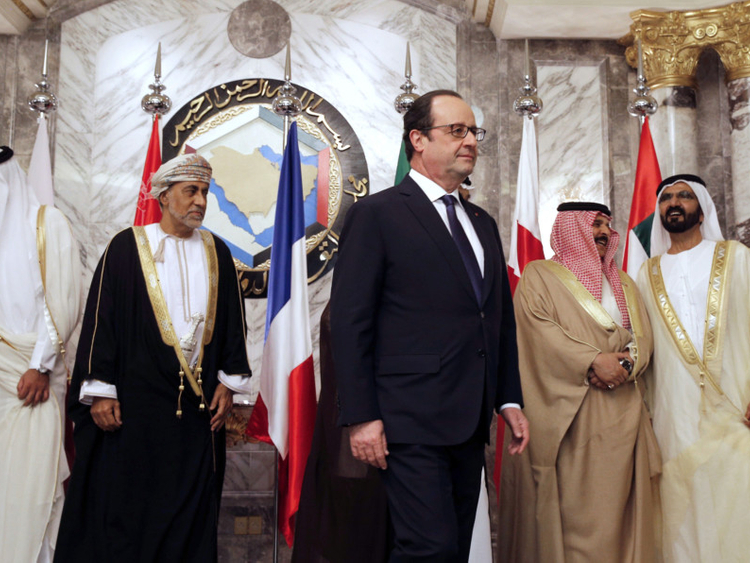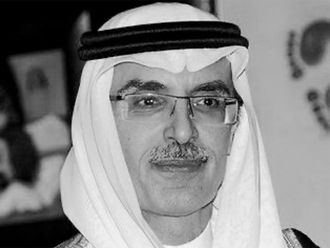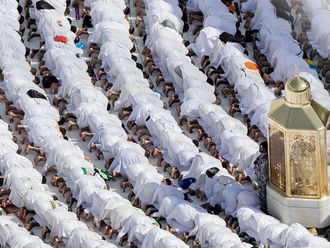Riyadh: The leaders of the Gulf Cooperation Council (GCC) Member States concluded here on Tuesday their 15th Consultative Meeting under the chairmanship of Saudi King Salman Bin Abdul Aziz Al Saud.
The GCC leaders welcomed King Salman, remembering with pride efforts and initiatives launched by late King Abdullah Bin Abdul Aziz Al Saud.
The GCC leaders congratulated Sultan Qaboos Bin Saeed of Oman on his safe return to Oman.
The GCC leaders also welcomed the participation of President Francois Hollande of the French Republic in this consultative meeting, lauding existing coordination and cooperation among the GCC countries and France and their identical visions regarding important issues in the region and world.
The GCC leaders also looked forward to meeting with US President Barack Obama in the United States, wishing that the talks contribute to strengthening close relations with the United States in light of current developments and events and to enhance the security and stability of the region.
The GCC leaders reviewed the latest developments in Yemen, lauding the objectives and outcomes of the Operation Decisive Storm and that start of Operation Restore of Hope in response to the request of Yemeni President Abed Rabbo Mansour Hadi in order to strengthen the legitimacy and resume the political process in accordance with the GCC initiative and its executive mechanism, output of the National Comprehensive Dialogue and the Security Council's relevant resolutions.
The GCC leaders praised the Security Council resolution, which was issued under Chapter VII of the Charter of the United Nations, and called for its implementation completely and accurately in order to contribute to the return of security and stability in Yemen and the region.
They also welcomed the decision of the United Nations Secretary General to appoint Esmail Ould Shaikh Ahmad as new special envoy of United Nations to the Republic of Yemen.
The GCC leaders welcomed the decision of President Abdu Rabbu Mansour Hadi to hold a conference under the umbrella of the General Secretariat of the Gulf Cooperation Council in Riyadh on May 17, with the participation of all Yemeni parties and components supporting the legitimacy and Yemen's security and stability.
They also welcomed the decision appointing Eng. Khalid Bahah as Yemeni Vice President and Major General Mohammad Ali Al Maqdeshi as Chief of Staff.
The GCC leaders stressed their support of the urgent measures taken by the Yemeni government to address the difficult and dangerous humanitarian situation caused by the irresponsible practices of the Houthi militias and militias of former President Ali Abdullah Saleh.
In this context, they lauded the generous support worth $274 million by the Kingdom of Saudi Arabia for Yemen as well as the urgent humanitarian aid provided by the GCC countries. They called upon the international community to accelerate providing more humanitarian aid to Yemen.
The GCC leaders reviewed the latest developments in Yemen, lauding the objectives and outcomes of the Operation Decisive Storm and that start of Operation Restore Hope in response to the request of Yemeni President in order to strengthen the legitimacy and resume the political process in accordance with the GCC initiative and its executive mechanism, output of the National Comprehensive Dialogue and the Security Council's relevant resolutions.
The GCC leaders stressed their support of the urgent measures taken by the Yemeni government to address the difficult and serious humanitarian situation caused by the irresponsible practices of the Houthi militias and militias of former President Ali Abdullah Saleh.
In this context, they lauded the generous support worth $274 million by the Kingdom of Saudi Arabia for Yemen as well as the urgent humanitarian aid provided by the GCC countries. They called upon the international community to accelerate providing more humanitarian aid to Yemen.
The GCC leaders welcomed Saudi Arabia's decision in coordination with the coalition countries, within the framework of continuation of enhancing its positive humanitarian efforts inside the Yemeni territory regarding creation of safe havens at specific times for distributing humanitarian aid, which comes in line with Security Council resolution with emphasis on not being exploited by Houthi militias and their allies to achieve gains on the ground, otherwise it will lead to resumption of air operations over these areas.
In order to speed the delivery of aid to the people of Yemen, the GCC leaders welcomed the Kingdom of Saudi Arabia's decision regarding establishment of a unified centre in Riyadh aiming to coordinate all efforts to provide assistance by the United Nations and relevant humanitarian organisations as well as the states wishing to provide assistance to the Yemeni people, including enabling the United Nations to deliver aid ordered by Saudi King Salman.
The GCC leaders reiterated their determination to continue efforts to support development in the Republic of Yemen and completion of taking steps and measures towards strengthening integration and partnership between the GCC and Yemen, stressing the GCC support for all efforts to complete the political process in accordance with the GCC initiative and its executive mechanism and outputs of the National Comprehensive Dialogue and the Security Council's relevant resolutions and to enhance security and stability in Yemen.
Regarding the Palestinian cause, the GCC leaders confirmed that a comprehensive, just and lasting peace cannot be achieved without the full withdrawal of Israel from all Arab territories occupied in 1967, and establishment of an independent Palestinian state with Al Quds as its capital in accordance with the resolutions of international legitimacy and the Arab peace initiative.
They condemned the repeated brutal attacks carried out by the Israeli occupation authorities and Israeli extremists against the unarmed Palestinian citizens, religious shrines and places of worship.
As far as Syrian crisis is concerned, the GCC leaders expressed deep concern over the continuing deterioration of the humanitarian situation in Syria as a result of a continuation of Al-Assad regime in killing, destruction and using of heavy weapons, and poisonous gas which resulted in the killing of hundreds of thousands of Syrians, and displacement of millions of Syrian people.
They emphasised the need for a political solution to the Syrian crisis in accordance with Geneva 1 Statement on 12, June, 2012 in order to ensure the security and stability to Syria and the unity of its territory as well as meet aspirations of the Syrian people. They stressed the need for concerted international efforts to deliver humanitarian assistance to all affected civilians and support all efforts to assist and protect the Syrian displaced people and refugees.
The GCC leaders expressed their support of the Iraqi government's efforts for national reconciliation to combat ISIL terrorist organisation and to achieve full participation of all components of the Iraqi people through the full implementation of the reforms program which was agreed upon during last summer.
The GCC leaders expressed concern about increasing acts of violence and terrorism which threaten security, stability and unity in Libya. They reiterated their support for the elected parliament and legitimate government, expressing their support for the United Nations efforts for resumption of national comprehensive dialogue among the components of the Libyan society, calling upon all spectra of the Libyan people to assume national responsibilities and continue dialogue to find a solution to end the state of division.
The GCC leaders stressed the need to deal with dangerous terrorist phenomenon and extremist terrorism movements, lauding the efforts of all member states in this regard at all levels. They also praised ability of the GCC security agencies in eradication of this dangerous phenomenon, stressing a need and importance of cooperation among all countries of the world to fight against the phenomenon of terrorism. They stressed the GCC commitment to continue the participation in the international coalition to combat ISIL.
The GCC leaders confirmed the GCC keenness to build balanced relations with the Islamic Republic of Iran that could contribute to strengthening the regional security and stability, expressing their aspirations to see normal relations with Iran be re-established based on mutual respect of the principles of good neighborliness and respect for the sovereignty of the states, and take serious steps to rebuild trust and adherence to the principles of international law and the United Nations, which are based on good neighbourliness and to prevent interference in the internal affairs of countries in the region, and to refrain from the use of threat or force.
The GCC leaders expressed hope that the initial framework agreement which has been reached between Iran and the Group (5 +1) would pave the way for a comprehensive final agreement on the Iranian peaceful nuclear programme, hoping that the agreement would ensure harmony and meet all the international standards, including standards relating to the security and safety of nuclear facilities and full supervision of the International Atomic Energy Agency in addition to address all concerns and environmental implications.
The GCC leaders look forward that the agreement could contribute to resolving the outstanding issues with Iran, among other, backing the UAE's right and absolute sovereignty over the three islands: Greater Tunb, Lesser Tunb and Abu Musa in addition to territorial waters, air territory, continental shelf and exclusive economic zone of the islands, being integral parts of the United Arab Emirates.
They expressed rejection of the continued occupation by the Islamic Republic of Iran to the islands, all decisions. The GCC leaders also reject Iran's practices and actions over the three islands. They considered them null and void as they do not change any of the historical and legal facts, which confirm, the UAE's sovereignty over the three islands.
The GCC leaders called upon the Islamic Republic of Iran to respond to the efforts of the UAE to resolve the issue through direct negotiations or refer it to the International Court of Justice.
They thanked the King of Saudi Arabia, government, people of Saudi Arabia and officials.













